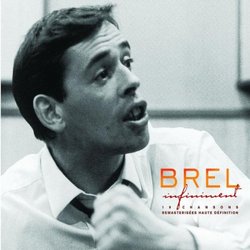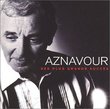This 2003 Edition Has No Printed Translation. Buy the 2004
John Boland | USA | 10/15/2005
(1 out of 5 stars)
"Jacques Brel is one of the greatest singer/songwriters in recorded history. You will make a BIG mistake if you judge him soley by listening to the short recorded "previews" on Amazon. This guy may not have the greatest voice, but he has "Soul" in abundance! It is his "soul" or "spirit" that makes his songs and singing so thrilling! BUT DO NOT BUY THIS EDITION OF "INFINIMENT". This is the 2003 Imported edition. Yes, it is alittle cheaper than the 2004 domestic edition of "Infiniment"....but this edition (2003) HAS NO TRANSLATIONS. That is acceptable if you speak French, but we English speaking people NEED THE TRANSLATIONS to understand what the songs are about. Instead of this edition, buy the 2004 "Infiniment" also sold on Amazon at a different web address. And, with the brilliant songs and dramatic presentation by M. Brel, you just might become intrigued enough to, someday, purchase the 3 disc DVD Set so that you will be able to SEE as well as HEAR this brilliant performer. Bon appetite! Enjoy! Email:boland7214@aol.
"
10 Brel Treasures among 40 Songs, but No English Translation
J.S. | California, United States | 09/23/2005
(5 out of 5 stars)
"
For those of us using Brel's songs to help us learn or improve our French, it's important to understand the difference between this 2-disc set, released in 2003 on the Universal Music label (ASIN: B0000AA8V2), and the other version of Infiniment released in 2004 on the DRG Records label (ASIN: B0002PUHGU).
The songs themselves are the same, all sung in French (except for Marieke and Le Plat Pays, which are in Flemish and French). However, the DRG Records version includes official but abridged English translations of all 40 songs in the liner notes, along with English/French song titles. The original French lyrics are not included. The translations on DRG Records' version were done by the highly talented Amazon.com reviewer Thelma Blitz.
The Universal Music version includes song titles in French only, and printed French lyrics for tracks 2 through 6 of Disc 1 only. There are no printed lyrics at all for the remaining 35 songs, and no English translations of lyrics for any of the 40 songs.
To get the printed lyrics of all 40 songs in both French and English, one must purchase the DRG Records version of the Infiniment CD and a separate book of Brel's original French lyrics, such as "Jacques Brel, Oeuvre Integrale" (ISBN 2-221-01068-X or -8) or "Tout Brel" (ISBN: 2264033711), and a terrific French-English dictionary to use in studying Brel's chansons is the "Collins-Robert French Dictionary Complete & Unabridged" (ISBN: 000718381X).
The Songs on Disc 1:
"La Quete" (The Quest, Track 1, Disc 1) is better known as "The Impossible Dream". This is Brel's version of the song also crooned by Elvis Presley, Andy Williams and The Supremes, and originally created by Mitch Leigh and Joe Darion. I don't believe Brel's version is as satisfying as the original in English, however, at least for native English speakers.
Tracks 2 through 6 (Disc 1) are songs created in 1977, a year before Brel's death, but released for the first time by Brel's family through the International Jacques Brel Foundation in Brussels (check it out online). Brel recorded these after part of one lung had already been removed due to lung cancer.
Their release was somewhat controversial, at least with some of the musicians who worked with Brel over the years, because Brel had not finalized these recordings prior to his death. They felt that Brel's artistic vision would have been better served and better respected by keeping these recordings unpublished. On the other side, there was considerable demand for his last unpublished recordings and a lot of heartfelt gratitude towards the Brel family on the part of Brel fans around the world, who were ecstatic at this release of his previously unheard recordings.
Tracks 7 through 10 (Disc 1) had been previously released in 1977 on the Barclay label. Track 11 (Disc 1) is J'Arrive (I Arrive), which was previously released in 1968 on Barclay.
Tracks 12 through 15 and 18 through 20 (Disc 1) are in my view 7 of Brel's greatest songs of all, due to the elegant literary quality of his lyrics, the raw passion expressed in his voice, and the beautiful and haunting melodies and/or accompanying orchestrations.
"Quand On N'a Que L'amour" (When We Have Only Love, Track 12, Disc 1) is Brel's quintessential theme song (circa 1960) for idealistic young lovers who believe that love conquers all, in stark contrast to Brel's later more jaded songs, ranging from "Le Prochain Amour" (The Next Lover, Track 18, Disc 1) in 1961 to "La Chanson des Vieux Amants" (Song of the Old Lovers, Track 19, Disc 1) in 1967. "Quand On N'a Que L'amour" strikes a similar tone of optimism as another Brel song, "Au Printemps", which is not included in the Infiniment collection.
"Le Plat Pays" (The Flat Country, Track 13, Disc 1) is Brel's nostalgic homage to his home country of Belgium, sung with great affection in French and Flemish. Although he grew up in Belgium, he spent nearly his entire musical career in Paris, France.
"Mon Enfance" (My Childhood, Track 14, Disc 1), one of Brel's most passionate songs, takes a candid look back at what Brel describes as a quite unhappy childhood, accompanied by ravishingly beautiful accompaniment by piano, cello, singing saw and orchestra that manage to convey a strong sense of nostalgia despite the misery Brel describes. The English translation is very abridged due to space limitations in the liner notes.
"Les Vieux" (The Old People, Track 15, Disc 1), evokes a ticking clock as a metaphor for the passage of time. It paints a grim portrait of life in the twilight years, set to the beat of a grandfather clock, a triangle and a small orchestra.
"Le Prochain Amour" (The Next Lover, Track 18, Disc 1) is Brel's world-wisened and world-weary evaluation of love: "...it's good to be in love... I know just the same that the next love will be my next defeat..."
"La Chanson des Vieux Amants" (Song of the Old Lovers, Track 19, Disc 1) is a wonderful nostalgic look back at a romance of 20 years: all the storms the couple has endured, and "the sweet tender marvelous love" that continues today even as their "tender war" persists. To me, Brel's passionate singing and the wonderful piano and orchestral accompaniment evoke all the romance and nostalgia of a World War II era Casablanca, making this one of Brel's greatest classic songs.
"Ne Me Quitte Pas" (Don't Leave Me, Track 20, Disc 1) is Brel's most famous torch song, in which he uses exquisite imagery to press his suit with a girl who has already left him, descending in the end into abject desperation as he struggles to maintain a link, any link at all, with the object of his love. Frank Sinatra was moved to sing an English version of this song called "If You Go Away", which unfortunately doesn't do justice to the stunning poetry of the French original. The version on this CD uses a gorgeous piano accompaniment and a soto voce orchestra in the background. The last verse adds a flute to the piano accompaniment. This is my favorite song of the entire Jacques Brel repertoire because of the power and the haunting beauty of the lyrics, Brel's impassioned voice and the evocative music!
Some Great Songs on Disc 2:
"Amsterdam" (Track 1, Disc 2) is one of Brel's most famous songs. It's about the sailors who disembark in this Dutch port and how they deal with the vicissitudes of their lonely lives and the dreams that haunt them once they reach the shore.
"L'enfance" (Childhood, Track 6, Disc 2) is a song from the 1973 French comedy film "Far West" directed, co-scored and co-written by Jacques Brel, who also acted in the film. This song evokes a much more positive view of childhood than "Mon Enfance", and suggests how maintaining some of the elements of childhood can enhance life even in old age.
"Marieke" (Track 13, Disc 2) is a nostalgic song about a first love that played out on the beaches of Belgium one summer in his teen years. It alternates charmingly between Flemish and French, the two national languages of Belgium.
If you don't mind the lack of English translations, you might also enjoy the largest affordable collection of Brel songs I've found, Quand on N'a Que L'amour (ASIN: B00000IYC9) of 49 songs on 3 CD's, which includes a 31-page section containing an essay in French on Brel's life and music, punctuated with beautiful black & white and color photos of Brel in performance.
What's even more fabulous than the CDs, however, is the 3 volume DVD set released in 2003: Jacques Brel: Comme quand on etait beau. (ASIN: B0000AQJPR). The set includes 7.5 hours of live and staged performances as well as interviews and home video footage. Everything that the heart of a Jacques Brel fan desires to capture the essence of this very theatrical artist in a way that an audio only recording can not."


 Track Listings (20) - Disc #1
Track Listings (20) - Disc #1

